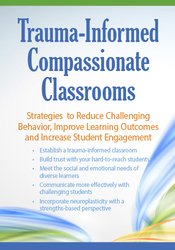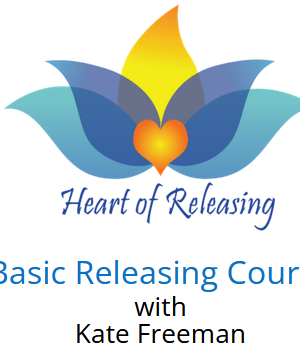Jennifer L. Bashant – Trauma Informed Compassionate Classrooms
$219.00 Original price was: $219.00.$61.75Current price is: $61.75.
As an educator, you are faced with the challenge of meeting the social and emotional needs of all your students. This can be challenging enough with typical learners but it is even more difficult with those who have experienced trauma or have mental health challenges.
Jennifer L. Bashant – Trauma Informed Compassionate Classrooms
Trauma in Students: What to Look For
- Fight, flight or freeze responses: How it manifests in school
- Wired for fear: Impact on the whole child
- ACEs – Adverse Childhood Experiences study and survey
- The role of poverty and mental health challenges
Trauma Therapy
- Benefits
- Limitations of the Research
- Potential Risks
Discipline in a Trauma-Informed Classroom
- Changing your mindset: Punitive vs. collaborative
- Strategies to foster intrinsic motivation
- 3 steps to implement a collaborative approach
- Case study: How you respond
Neuroplasticity: Activities to Establish & Strengthen Neural Pathways
- Strategies to develop new ways of responding
- Slow down, stop and think
- Respond rather than react
- Social stories
- Techniques to incorporate the 4 R’s:
- Rhythmic
- Repetitive
- Relational
- Rewarding
Relationships as a Protective Factor
- Techniques to form positive relationships and increase students’ likeliness to:
- Stay in school longer
- Work harder
- Increase test scores & grades
- Increase their self-confidence
- Techniques to help students feel connected to school making them less likely to:
- Smoke or drink
- Have sexual intercourse
- Develop emotional problems
- Experience suicidal thoughts or attempts
- Carry weapons
- Be involved in violence or dangerous activities
- Case study: Strengths-based, solution-focused approach
Mindfulness and Self-Awareness Activities To:
- Help with transitions
- Reduce impulsive behaviors
- Strengthen empathy, kindness and compassion
- Calm and focus attention
Social and Emotional Learning Techniques to Increase:
- Focus and concentration
- Impulse control
- Conflict resolution skills
Mindful Communication Tools to Improve Student Engagement
- Lead with presence
- Attention
- Intention
Mindful Strategies to Increase Connection, Empathy & Community
- Gratitude
- Heartfulness
Zones of Regulation to Teach Self-Awareness & Emotional Control
- Red zone
- Yellow zone
- Green zone
- Blue zone
Would you like to receive Jennifer L. Bashant – Trauma Informed Compassionate Classrooms ?
Description:
As an educator, you are faced with the challenge of meeting the social and emotional needs of all your students. This can be challenging enough with typical learners but it is even more difficult with those who have experienced trauma or have mental health challenges. Students who have experienced trauma often present as difficult to engage and display problematic behavior such as a low frustration tolerance, angry outbursts or difficult social relationships. These behaviors all get in the way of teaching and learning. When a student has experienced trauma, he/she often spends much of the day in fight/flight/freeze mode which limits their capacity to learn. Their outwardly aggressive and irritable behaviors also disrupt the flow in the classroom, requiring your time and attention. Despite the amount of time you invest in behavior charts or incentives for good behavior, traditional behavioral approaches to classroom management and a punitive approach to discipline simply are not effective.
Watch Dr. Bashant and learn how a trauma-informed approach will greatly reduce challenging behavior, improve student engagement and increase learning outcomes. Finish this recording with new strategies, tools and resources to reduce students’ impulsiveness, aggressive behaviors and inattention and increase their focus, attention and compassion. While this positive approach is absolutely essential for students with trauma, it will also greatly benefit each and every student in your classroom. Return to your school with:
- Research-based practices to establish a trauma-informed classroom
- A plan to develop positive relationships and build trust with your hard-to-reach students
- Prove techniques for communicating more effectively and collaboratively with challenging students
- Cognitive skill-building strategies which incorporate the science of neuroplasticity and the strengths-based perspective of neurodiversity
Be the first to review “Jennifer L. Bashant – Trauma Informed Compassionate Classrooms” Cancel reply
Related products
Health & Medical
Health & Medical
2018 High Risk Obstetrics Current Trends, Treatments & Issues
Health & Medical
Health & Medical
Health & Medical
Health & Medical













Reviews
There are no reviews yet.